美语从头学笔记
赖世雄美语从头学初级篇Lesson 36学习笔记
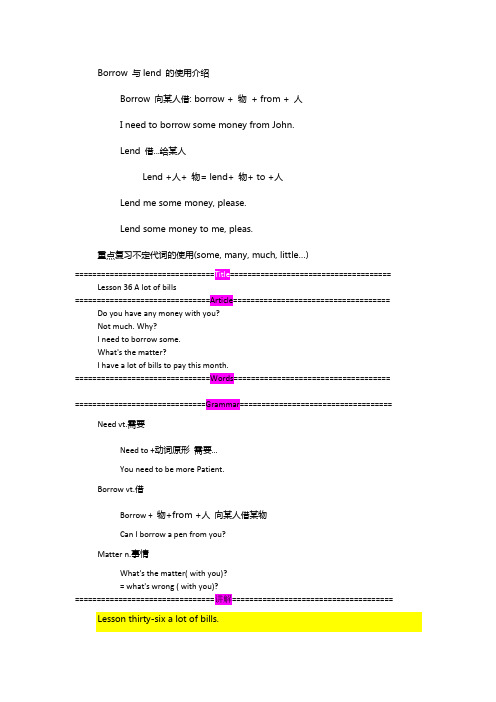
Borrow 与lend 的使用介绍Borrow 向某人借: borrow + 物+ from + 人I need to borrow some money from John.Lend 借...给某人Lend +人+ 物= lend+ 物+ to +人Lend me some money, please.Lend some money to me, pleas.重点复习不定代词的使用(some, many, much, little…)===================================================================== Lesson 36 A lot of bills===============================Article==================================== Do you have any money with you?Not much. Why?I need to borrow some.What's the matter?I have a lot of bills to pay this month.===============================Words==================================== ==============================Grammar=================================== Need vt.需要Need to +动词原形需要…You need to be more Patient.Borrow vt.借Borrow + 物+from +人向某人借某物Can I borrow a pen from you?Matter n.事情What's the matter( with you)?= what's wrong ( with you)?================================讲解===================================== Lesson thirty-six a lot of bills.Hello this is Peter Lai again. Very happy to be on the air. Now let's open this book to page one hundred fifty-seven. Page one hundred fifty-seven on this page we can see lesson thirty-six "A lot of bills."A lot of 后可以放复数名词或不可数名词.He has a lot of money. I have a lot of time.He has a lot of friends.而否定要用much.He doesn't have much money. = he doesn't have a lot of money.而肯定句尽量用a lot of.否定句用a lot of, much都可以He doesn't have much time. 他没有许多的时间.不要用在肯定句:He has much time. He has much money. 错错错.Much 多与not 并用在否定句中Bill 是可数名词" 账单"A bill. Two bills. Many bills.Part on reading.I feel sorry for Al. 我对al表示难过.This is a dialog between a boy by the name of Al and a girl by the name of Sue. Al 和Sue的对话.Al doesn't have much money. I feel sorry for him.他钱不多,我为他感觉难过.I feel sorry for you, John. 我为你感到难过.Do you have any money with you?any用在否定句或疑问句中后放可数不可数名词. 同时放单数,复数都可Do you have any friend/ friends?No, I have no friend/ friends. No后也是可以放单数或复数名词Yes, I do. Have ten dollars with me. 我有10块钱(在身上)With 在be动词后也有用法.She is with Peter now. 他现在跟皮特在一起. (这表示他以前和别人一起的). Now she is with Peter.I don't like to be with him. 我不喜欢和他一起.He doesn't study, he is not a good student. I don't like to be withhim. 他不是五道杠学生,我不喜欢和他一起.How much money do you have with you? 你有多少钱在身上?much用于不可数,many用于可数.How many friends do you have? (没有with you)你有多少朋友?I have twenty dollars with me. 我身上有20块钱.Not much. Why?Yes, I do. But I don't have much money with me. 这简化出来的.Do you have any friends? 你有没有朋友啊?Yes, I do, but I do not have many friends. 我有但不多.Why do you ask me such a question? 你为什么问这狗屁问题?Why 也等于what for.I need to borrow some.Need 的用法之前有介绍过,与want 差不多.我们来复习一下Need to +动词原形. You need to be more careful.你需要更小心.Need +人/物: I need you.我需要你. I need some food.Need + 人+ to +动词原形:I need you to go away.我要你滚蛋.还有need与want的分别记得吗?Need 翻译: 需要(更强烈). Want 翻译: 想要(无可无不可). 在一些情况下可相互代用.I need to 在这等于I want toI want to borrow some.I need to write a letter. I want to write a letter.Borrow 借Borrow +物+ from +人I need to borrow twenty dollars from him.我要跟他借20块.Don't borrow money from him. 不要向他借钱.Lend. 把……借给…Lend + 人+ 物(这有点像授予动词吧)= Lend +物+ to +人不要借钱给他(他从来不还的)Don't lend him any money.Don't lend any money to him.原句写的borrow some 是省略,原句应该是:I need to borrow some money from you.What's the matter?matter在这虽然是名词,但当成形容词用.= wrong.You are wrong. You give me the wrong answer.你错了,你给了我错误的回答.Two and two are four.You are right. 你太聪明了.What's the matter? = what's wrong?What's wrong? Lady.There is nothing wrong/ (the matter).nothing大家还记得: 他的形容词要放后面修饰.这里一样可以放the matter.证明看起来是个名词,实际当形容词用.There's nothing wrong with me.我没问题.他出什么问题了: there is something wrong with him.There is something the matter with him.I have a lot of bills to pay this month.时间副词:To pay this month.看起来好像是: 付这个月. 其实不是This month虽然也是个名词样,但当成时间副词用的. 也可以放在句首This month I have a lot of bills to pay.This +时间名词前面都不需要加介词 .I'll be very busy this week. 这个星期我会很忙.This year I'll be very busy. 今年我会很忙.(这下完了)Pay 支付You should pay the money.你要付这笔钱.You should pay the bill. 你要付这个账单 .轮到你付账了It is your turn. 轮到你啦.It's your turn to pay the bill.练习:Marry is crying.What's the matter with her?What's wrong with her?She doesn't have money.She doesn't have much money.Can you lend me ten dollars?Can you lend ten dollars to me?Don't borrow any money from him.===============================Practice=================================== 这里主要复习不定代词There are ____ pencils on the table.A few, much, little, a little.这里很明显,pencils是复数,所以一下就排队了3个Much 很多. 修饰不可数. 而且用于否定句.Little 没有多少.修饰不可数A little, 有一些. 同样修饰不可数There is little time left. 没剩下多少时间了.There is still a little time. 还有点时间.Few,修饰可数, 没多少A few 有一些, 修饰可数我有一些朋友: I have a few friends.我没几个朋友: I have few friends.We need ____ food for the party.Many, several, a lot, lots of.Many 很多, 修饰可数Several 一些,修饰可数记得课文吗: there are several foreign students in my classA lot of, 很多, 修饰可数不可数Lots of, 就等于a lot of. 但注意看,这里面的选择,没有of.He has a lot of friends. == he has lots of friends.He has a lot of money. == he has lots of money.How ____ students are in the room?Much, few, many, a few.这里how开头表示多少的的疑问句,只有how much/ how many而much问不可数,many 用在可数,所以...There is ____ juice in the refrigerator.Lots, a little, a lots of, many.上面现在都解释过了,所以接下来的应该会了There are many students in the classroom.There are ____children playing in the yard.A little, much, several, severals.There is something ____ with Fred.Matter, the matter, the wrong, what's wrong.这里复习the matter, wrong的使用. wrong是形容词不加冠词================================others===================================。
赖世雄美语从头学之美语音标笔记
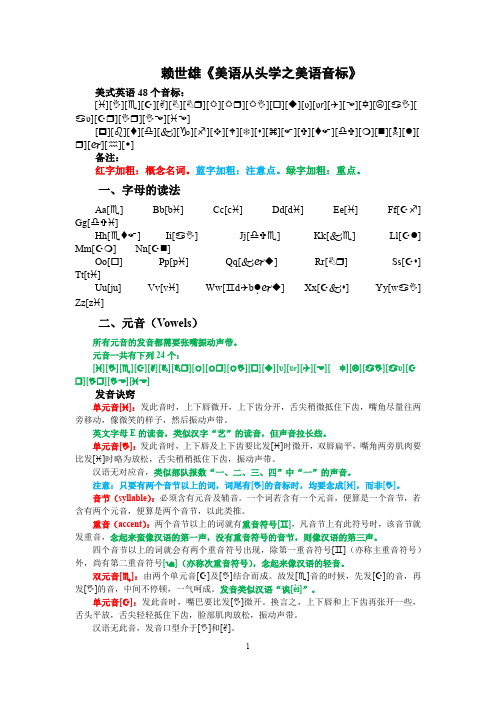
赖世雄《美语从头学之美语音标》美式英语48个音标:[♓][✋][♏][☪][✌][ ][ ❒][ ][ ❒][ ✋][☐][◆][υ][υr][✈][☜][✡][☹][♋✋][♋υ][☪❒][✋❒][✋☜][♓☜][☐][♌][♦][♎][ ][♑][♐][ ][ ][❆][♦][ ][☞][✞][♦☞][♎✞][❍][⏹][☠][●][❒][ ][♒][♦]备注:红字加粗:概念名词。
蓝字加粗:注意点。
绿字加粗:重点。
一、字母的读法Aa[♏] Bb[b♓] Cc[c♓] Dd[d♓] Ee[♓] Ff[☪♐] Gg[♎✞♓]Hh[♏♦☞] Ii[♋✋] Jj[♎✞♏] Kk[ ♏] Ll[☪●] Mm[☪❍] Nn[☪⏹]Oo[☐] Pp[p♓] Qq[ ◆] Rr[ ❒] Ss[☪♦] Tt[t♓]Uu[ju] Vv[v♓] Ww[♊d✈b●. ◆] Xx[☪♦] Yy[w♋✋] Zz[z♓]二、元音(Vowels)所有元音的发音都需要张嘴振动声带。
元音一共有下列24个:[♓][✋][♏][☪][✌][ ][ ❒][ ][ ❒][ ✋][☐][◆][υ][υr][✈][☜][ ✡][☹][♋✋][♋υ][☪❒][✋❒][✋☜][♓☜]发音诀窍单元音[♓]:发此音时,上下唇微开,上下齿分开,舌尖稍微抵住下齿,嘴角尽量往两旁移动,像微笑的样子,然后振动声带。
英文字母E的读音,类似汉字“艺”的读音,但声音拉长些。
单元音[✋]:发此音时,上下唇及上下齿要比发[♓]时微开,双唇扁平,嘴角两旁肌肉要比发[♓]时略为放松,舌尖稍稍抵住下齿,振动声带。
汉语无对应音,类似部队报数“一、二、三、四”中“一”的声音。
注意:只要有两个音节以上的词,词尾有[✋]的音标时,均要念成[♓],而非[✋]。
音节(syllable):必须含有元音及辅音。
一个词若含有一个元音,便算是一个音节,若含有两个元音,便算是两个音节,以此类推。
赖世雄美语入门学习笔记
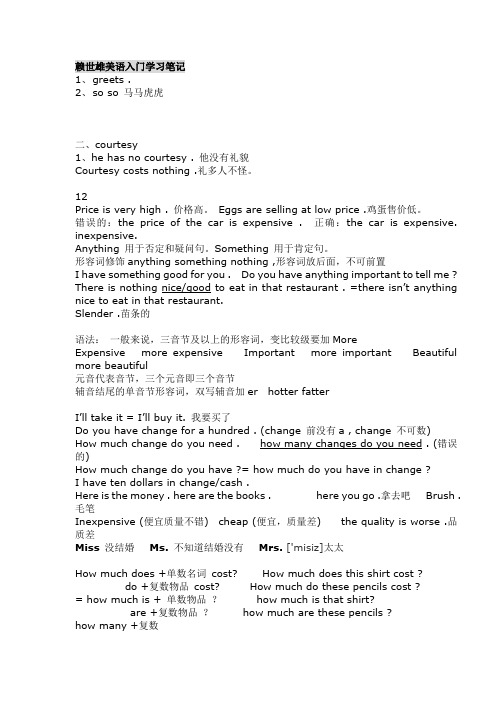
赖世雄美语入门学习笔记1、greets .2、so so 马马虎虎二、courtesy1、he has no courtesy . 他没有礼貌Courtesy costs nothing .礼多人不怪。
12Price is very high . 价格高。
Eggs are selling at low price .鸡蛋售价低。
错误的:the price of the car is expensive . 正确:the car is expensive. inexpensive.Anything 用于否定和疑问句。
Something 用于肯定句。
形容词修饰anything something nothing ,形容词放后面,不可前置I have something good for you . Do you have anything important to tell me ? There is nothing nice/good to eat in that restaurant . =there isn’t anything nice to eat in that restaurant.Slender .苗条的语法:一般来说,三音节及以上的形容词,变比较级要加MoreExpensive more expensive Important more important Beautiful more beautiful元音代表音节,三个元音即三个音节辅音结尾的单音节形容词,双写辅音加er hotter fatterI’ll take it = I’ll buy it. 我要买了Do you have change for a hundred . (change 前没有a , change 不可数) How much change do you need . how many changes do you need . (错误的)How much change do you have ?= how much do you have in change ?I have ten dollars in change/cash .Here is the money . here are the books . here you go .拿去吧Brush .毛笔Inexpensive (便宜质量不错) cheap (便宜,质量差) the quality is worse .品质差Miss没结婚Ms. 不知道结婚没有Mrs.['misiz]太太How much does +单数名词cost? How much does this shirt cost ?do +复数物品cost? How much do these pencils cost ?= how much is + 单数物品?how much is that shirt?are +复数物品?how much are these pencils ?how many +复数13课Hostess 女服务员I’d like to book(reserve) a table for seven. 订桌子(门票通常用reserve)Do you have a table for two ? =do you have a table for two people.有两个人的桌子么May I have the menu .我能看菜单么。
赖世雄初级美语入门
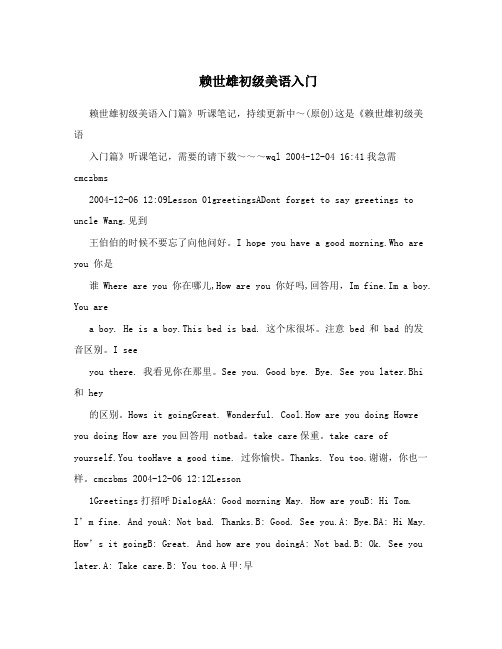
赖世雄初级美语入门赖世雄初级美语入门篇》听课笔记,持续更新中~(原创)这是《赖世雄初级美语入门篇》听课笔记,需要的请下载~~~wql 2004-12-04 16:41我急需cmczbms2004-12-06 12:09Lesson 01greetingsADont forget to say greetings to uncle Wang.见到王伯伯的时候不要忘了向他问好。
I hope you have a good morning.Who are you 你是谁Where are you 你在哪儿,How are you 你好吗,回答用,Im fine.Im a boy. You area boy. He is a boy.This bed is bad. 这个床很坏。
注意 bed 和 bad 的发音区别。
I seeyou there. 我看见你在那里。
See you. Good bye. Bye. See you later.Bhi 和 hey的区别。
Hows it goingGreat. Wonderful. Cool.How are you doing Howre you doing How are you回答用 notbad。
take care保重。
take care of yourself.You tooHave a good time. 过你愉快。
Thanks. You too.谢谢,你也一样。
cmczbms 2004-12-06 12:12Lesson1Greetings打招呼DialogAA: Good morning May. How are youB: Hi Tom.I’m fine. And youA: Not bad. Thanks.B: Good. Se e you.A: Bye.BA: Hi May. How’s it goingB: Great. And how are you doingA: Not bad.B: Ok. See you later.A: Take care.B: You too.A甲:早啊,小梅。
赖世雄美语从头学初级篇Lesson 8学习笔记
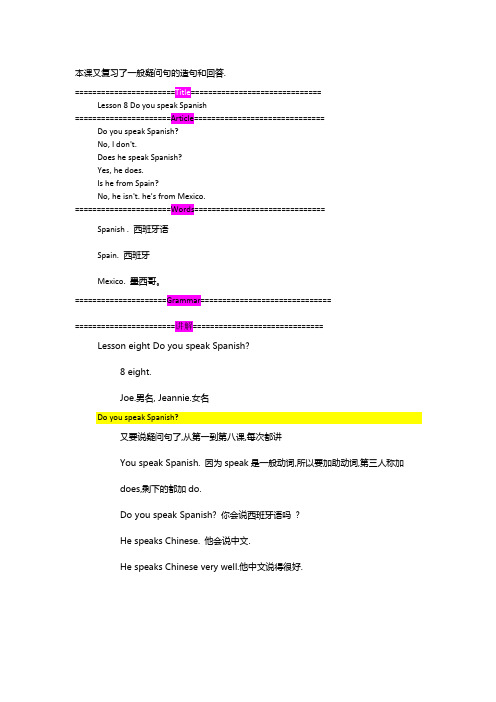
本课又复习了一般疑问句的造句和回答.=====================================================Lesson 8 Do you speak Spanish======================Article==============================Do you speak Spanish?No, I don't.Does he speak Spanish?Yes, he does.Is he from Spain?No, he isn't. he's from Mexico.======================Words==============================Spanish . 西班牙语Spain. 西班牙Mexico. 墨西哥。
=====================Grammar=====================================================讲解==============================Lesson eight Do you speak Spanish?8 eight.Joe.男名, Jeannie.女名Do you speak Spanish?又要说疑问句了,从第一到第八课,每次都讲You speak Spanish. 因为speak是一般动词,所以要加助动词,第三人称加does,剩下的都加do.Do you speak Spanish? 你会说西班牙语吗?He speaks Chinese. 他会说中文.He speaks Chinese very well.他中文说得很好.变成问句: does he speak Chinese? 中间有两处变化,第一是加了助动词,因为he是第三人称单数.第二个是speaks变成了speak因为之前有助动词,所以speak还原.No, I don't.No, I don't speak Spanish. 这里缩写了(真实用法都缩写)肯定回答: yes, I do. 这里回答人家说do,你也回do,人家说does,你也回does.live住He lives here.(因为he是第三人称单数,所以用lives)改疑问句: does he live here?我说得太多了接下来实在不愿意再说了,如果你从第一课到现在都看,那你一定明白为什么.Do you live here? 你住在这里吗?He has a bicycle. 他有自行车.(之前讲there is/are的时候说过,have是表示动物有什么东西.第三人称用has.英语中永远逃不了的第三人称单数的用法)I have a bicycle.我有自行车.You have a bicycle.你有自行车.你有自行车吗? Do you have a bicycle? Yes, I do.我有自行车吗? Do I have a bicycle? No, I don't.他有自行车吗? Does he have a bicycle? (has变成了have,同样又是因为前面有助动词影响)Does he speak Spanish?如果是陈述句: he speaks Spanish.他会说西班牙语.speaks又是第三人称单数,而改成疑问句,又是does第三人称单数的问题,我实在不想重复了.Yes, he does.如果否定: no, he doesn't.Is he from Spain?be动词造句: 上一课讲过之前也讲过,这次又来复习:就是把be动词和主语倒装就好了.She is beautiful. Is he beautiful?她漂亮. 她漂亮吗?这些都是用是否回答的叫一般疑问句.语调要上扬.He is from Guangdong. 他是广东人.Is he from Guangdong? 他是广东人吗?He comes from Guangdong. 他是广东人?Does he come from Guangdong? 他是广东人吗?You are from Beijing. 你是北京猿人.Are you from Beijing? 你是北京猿人吗?Yes I am.我是北京猿人. No, I am not. I from Mars.不,我不是,我是火星人.Do you come from Beijing?Spain 西班牙(国家) Spanish 西班牙文.No, he isn't. He’s from Mexico.He's 就是he is的缩写.Mexico.墨西哥.如果用come造句:Does he come from Spain?No, he comes from Mexico.======================Practice==============================Bob and Carl are brothers, but they ____ different. Bob ____quiet. Carl ____. Carlwatches TV. Bob____. Bob reads books. Carl ____. Bob and ____teacher are friends. Carl and ____ teacher ____.Perhaps Bob is an older brother, and Carl is a younger brother.也许Bob是哥哥, Carl是弟弟在翻译中,如果be动词后是名词,那就翻译是He is a student. 他是学生.而be动词后是形容词那就不翻译出来She is beautiful. 她漂亮.不要说她是漂亮的.TV就是电视,television的缩写这上面的填空都没有超编,如果前面的课程有认真学过一定能做出来,不是特别难.。
赖世雄美语从头学-入门篇
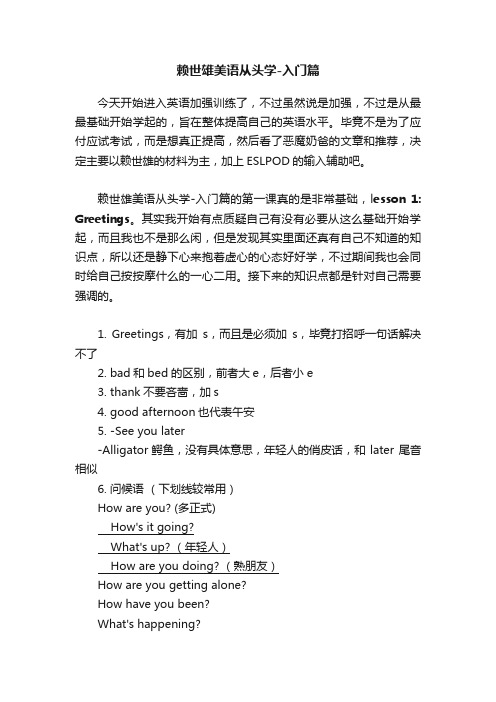
赖世雄美语从头学-入门篇今天开始进入英语加强训练了,不过虽然说是加强,不过是从最最基础开始学起的,旨在整体提高自己的英语水平。
毕竟不是为了应付应试考试,而是想真正提高,然后看了恶魔奶爸的文章和推荐,决定主要以赖世雄的材料为主,加上ESLPOD的输入辅助吧。
赖世雄美语从头学-入门篇的第一课真的是非常基础,lesson 1: Greetings。
其实我开始有点质疑自己有没有必要从这么基础开始学起,而且我也不是那么闲,但是发现其实里面还真有自己不知道的知识点,所以还是静下心来抱着虚心的心态好好学,不过期间我也会同时给自己按按摩什么的一心二用。
接下来的知识点都是针对自己需要强调的。
1. Greetings,有加s,而且是必须加s,毕竟打招呼一句话解决不了2. bad和bed的区别,前者大e,后者小e3. thank不要吝啬,加s4. good afternoon也代表午安5. -See you later-Alligator 鳄鱼,没有具体意思,年轻人的俏皮话,和later尾音相似6. 问候语(下划线较常用)How are you? (多正式)How's it going?What's up? (年轻人)How are you doing? (熟朋友)How are you getting alone?How have you been?What's happening?7. 问候答句区别a. 都有youHow are you?=How are you doing?=How are you getting alone?answer:I'm fine, thank you. (跟fine有关的回答持保留意见,比较多说法是一般不用fine这种回答,我个人听到最多的就是good) Fine, thanks.Great, thanks.Not bad, thanks.So-so, thank you.b. How have you been?这个问法是完成时,所以不能用amanswer:I have been fine, thank you.Fine, thank you.c. How's it going?answer: Not bad, thank you.So-so, thank you.Great, thank you.Fine, thank you.d. What's up/What's happening?answer: Nothing much.Same as usual.8. 感谢Thanks a lot. (非正式)Thanks a million (俏皮话)Lesson 2 Courtesy (礼貌)Idiom: Courtesy costs nothing. 礼貌不花钱;礼多人不怪。
美语从头学笔记重点讲义资料

《美语从头学·入门篇》笔记Lesson 1 Greetings 打招呼 (1)Lesson 2 Courtesy 礼貌 (3)Lesson 3 Name,Age and Nationality 姓名、年龄和国籍 (5)Lesson 4 Introductions 介绍 (7)Lesson 5 Occupations 职业 (8)Lesson 6 Time 时间 (10)Lesson 1 Greetings打招呼Ⅰ.Dialog 会话Dialog AA:Good morning,May.How are you?B:Hi,Tom.I'm fine.And you?A:Not bad.Thanks.B:Good.See you.A:Bye.甲:早啊,小梅。
你好吗?乙:嗨,汤姆。
我很好,你呢?甲:还不错,谢了。
乙:很好,再见。
甲:再见。
Dialog BA:Hi,May.How's it going?B:Great.And how are you doing?A:Not bad.B:Ok.See you later.A:Take care.B:You too.甲:嗨,小梅。
近来如何?乙:很好,那你呢?甲:还不错。
乙:好吧,再见。
甲:保重。
乙:你也是。
★1.GreetingsGreetings这个词是复数n.问候招呼致意Don't forget to say greetings to uncle Wang.★2.Dialog 会话★3.Good morning Good morning=I hope you have a good morning.★4.badBad 坏Bed 床This bed is bad.这张床坏了。
★5.Thanks这个词是复数★6.HiHi≈Hey。
Hey不礼貌。
★7.Great=wonderful=coolⅡ.Vocabulary﹠Idioms 单词短语注解★1.good morninggood morning--good afternoon--good evening晚上好Good night 晚安、再见≠good evening★2.It's a fine day today.今天天气不错。
(完整word版)赖世雄美语从头学初级篇Lesson31学习笔记
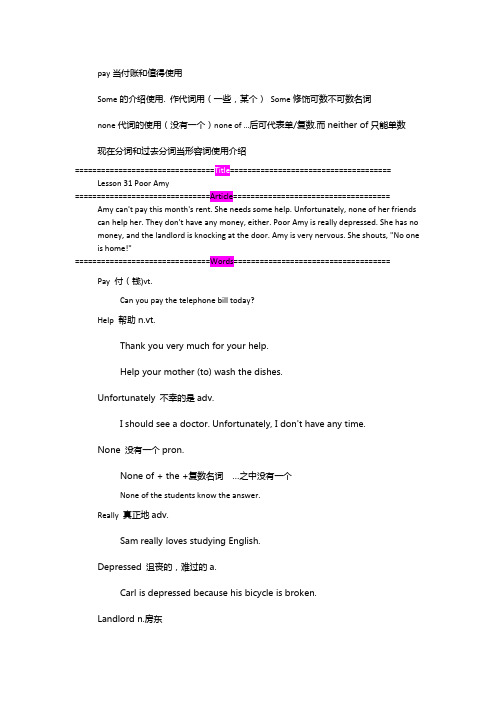
pay当付账和值得使用Some的介绍使用. 作代词用(一些,某个)Some修饰可数不可数名词none代词的使用(没有一个)none of …后可代表单/复数.而neither of只能单数现在分词和过去分词当形容词使用介绍===================================================================== Lesson 31 Poor Amy===============================Article==================================== Amy can't pay this month's rent. She needs some help. Unfortunately, none of her friends can help her. They don't have any money, either. Poor Amy is really depressed. She has no money, and the landlord is knocking at the door. Amy is very nervous. She shouts, "No one is home!"===============================Words==================================== Pay 付(钱)vt.Can you pay the telephone bill today?Help 帮助n.vt.Thank you very much for your help.Help your mother (to) wash the dishes.Unfortunately 不幸的是adv.I should see a doctor. Unfortunately, I don't have any time.None 没有一个pron.None of + the +复数名词…之中没有一个None of the students know the answer.Really 真正地adv.Sam really loves studying English.Depressed 沮丧的,难过的a.Carl is depressed because his bicycle is broken.Landlord n.房东Tenant n.租客Knock 敲(门)vi.Knock the door 错Knock at the door对Nervous 紧张的a.Exams make me very nervous.Shout vt.高呼,大声说出My teacher often shouts, "shut up!" when we are noisy.==============================Grammar=================================== 形容词some,及代词none的用法Some 用法She needs some help.此处some为形容词,表示“一些”。
赖世雄美语从头学初级篇Lesson 9学习笔记
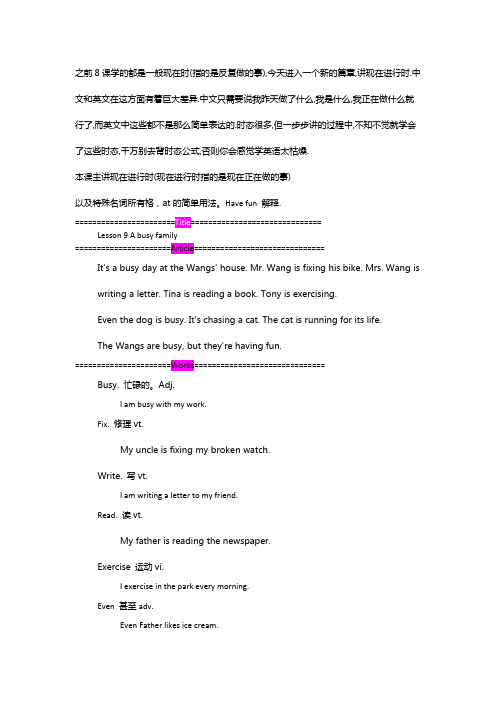
之前8课学的都是一般现在时(指的是反复做的事),今天进入一个新的篇章,讲现在进行时.中文和英文在这方面有着巨大差异.中文只需要说我昨天做了什么,我是什么,我正在做什么就行了,而英文中这些都不是那么简单表达的.时态很多,但一步步讲的过程中,不知不觉就学会了这些时态,千万别去背时态公式,否则你会感觉学英语太枯燥.本课主讲现在进行时(现在进行时指的是现在正在做的事)以及特殊名词所有格,at的简单用法。
Have fun 解释.=====================================================Lesson 9 A busy family======================Article==============================It's a busy day at the Wangs' house. Mr. Wang is fixing his bike. Mrs. Wang is writing a letter. Tina is reading a book. Tony is exercising.Even the dog is busy. It's chasing a cat. The cat is running for its life.The Wangs are busy, but they're having fun.======================Words==============================Busy. 忙碌的。
Adj.I am busy with my work.Fix. 修理vt.My uncle is fixing my broken watch.Write. 写vt.I am writing a letter to my friend.Read. 读vt.My father is reading the newspaper.Exercise 运动vi.I exercise in the park every morning.Even 甚至adv.Even Father likes ice cream.Chase 追逐vt.The policeman is chasing the thief.之前讲过及物动词不及物动词,vt.就是及物,vi.就是不及物=====================Grammar==============================It's a busy day at the Wangs' house.现在进行时Having fun.=======================讲解==============================Lesson nine A busy family.9 英文是nine.Busy 忙碌的a.Are you busy? 你忙吗?No I’m not. I am free now.我不忙,我现在有空.Free a.自由的,在这里是有空的I’m not busy. I am free.It's a busy day at the Wangs' house.It's = it is. it是代词,可以代替一般事物.it在这代表此刻.What time is it by your watch? 你的表几点了?It is five by my watch.我的表5点了,也可以写It's five now.或干脆it's five.It is windy. 今天是多风的.It's windy (today).The Wangs 是王姓这一家人. 但是所有格形式都是加's但这里单词最后一个是s,所以直接加'就好了" the Wangs'"是王家的所有格后面跟house就是说,王家的房子. family是抽象的家的意思,house就是住的这个房子.Mr. Wang is fixing his bike.王先生正在修理他的自行车.Bike 就是bicycle的简称.fix就是动词修理,加ing变成fixing 叫现在分词.He can fix the bike. 他会修自行车.但是要说他正在修车怎么说呢?这就引出了现在进行时.句型就是: 主语+ be动词+ 动词现在分词…He is fixing the bike. 他正修这辆自行车.中文里面所说的,正在…在英文中就要用现在进行时.我正在学习,学习单词是study.但要怎么表示我正在学习?主语:我+be动词(am) +study的现在分词(studying)I am studying.所有正在进行时,都可以在句尾加个now(现在),也可不加I am studying now.这样也可以Mr. Wang is fixing his bike now.这样也可以Mrs. Wang is writing a letter.本来学的是Mrs. Wang writes a letter.但那是常态(一般现在时) 代表她天天这样,一直这样.He writes very well.这样可以,因为他写的现在一直都是好的.He speak English very well.他说的英语一直都好,有这个隐含的意思.(当然不是说从生下来,而是说他现在都好)因此知道了,写信不可能是天天时时常态的在写.她的名词是常态,她的身高是常态,她天天工作的时间是常态.这些都用一般现在时.而他现在正在写信不是常态,而是现在进行时.Tina is reading a book.这里也是一样,她正在看书.Tony is exercising.这里也同样的.exercise. 是锻炼的动词.如果他天天早上运动,Tony exercises every morning.这就可以用一般现在时(常态)暗示他天天早上这样Even the dog is busy.Even 甚至. Even he can do it.甚至他都可以做这个.What is the dog doing? 狗子正在做什么?再复习一下造句,不要打我.The dog is doing what? 这是中文的方式先把疑问词放前: what the dog is doing?句中有be动词,所以be动词与主语倒装:What is the dog doing? 造句成功.再来一个: 你正在做什么啊?You are doing what?What are you doing? (这次不讲过程了)I am studying.我正在学习.It's chasing a cat.chase追赶,之前学过( well, your dog chases my cat)动词结尾是不发音的e把e去掉再加ing形成现在分词.The cat is running for its life.The cat is running…这猫正在跑…这里running是动词run的现在分词,为什么加个n再加ing你一定要先看grammar部分再来看讲解.这里就不说了for在这里是(为了)的意思. its它的,life生命.猫在为了它的生命而跑,就是翻译:它在跳命.The Wangs are busy, but they're having fun.They're having fun.又是一个现在进行时.Have fun是短语,玩得愉快的意思I am having fun.我正玩得高兴.并不是所有动词都可以改现在进行时I have some money.我有一些钱.I am having some money.我正在有些钱.这中文都说不通,同样英文也不能用.正在进行时使用和中文是一样的,我正在吃早餐:I am having breakfast. 这就可以了======================Practice============================== Mr. Wang is fixing hisBike.Television.Car.如果把这个句子变成问句,王先生正在做什么?Mr. Wang is doing what?What Mr. Wang is doing?What is Mr. Wang doing? 成功同样下面what is Tina doing?Tina is readingA book.A magazine.A newspaper.Tony isExercisingJogging.Playing basketball.What are you doing?I am jogging.。
赖世雄英语学习笔记

赖世雄美语笔记——魏仕超抄的学渣出版社STUDY-GARBAGE PRESS目录美语入门LESSON 1 greetings词汇:greetings n.问候招呼致意idiom n.短语句子:A:see you later B:alligaterhow are youhow are you doinghow are you getting alonehow have you beenhow's it goingwhat's upwhat's happeningLESSON 2 courtesy词汇:courtesy n.礼貌LESSON 3 what's your name词汇:nationality n.国籍句子:may I have your name please?=what's your name LESSON 4 family name词汇:family name 姓this that these those这个那个这些那些以上为指示代词,也可以有指示形容词的功能,例如this book is goodLESSON 5 how do you do相当于你好,不可以回答I'm fine词汇:occupation n.职业secretary n.秘书pilot n.飞行员句子:how do you do相当于你好,不可以回答I'm fine要说how do you do来回应what do you do你是做什么的LESSON 6 it's five past three词汇:ma'am n.夫人句子:it's five past three=it's three o five三点过五分,十分之后不用加"o"it's twenty to five=it's four fortyLESSON 7月份词汇:January February March April May June July August September October November December句子:June 2 1998这个2不是基数词,是序数词what's today's date今天几月几号LESSON 8 there be句型句子:how's the weather in Beijing=what's the weather like inBeijing表示“有”句首是人或动物应该使用haveI have a book句首是场所或时间,应该用there is/are在there is/are起首的句型中,应该将there视为固定用语,译成“有”而不要译成“那里是”,若要表示“那里/这里有...”应该说there is.....therethere is a man有个人there has a man 无此用法there is a man there 那里有个人LESSON 9 he's not in句子:he's not in他不在“留话”leave/take messageLESSON 10 can I be of any help for you词汇:clinic n.诊所句子:can I be of any help for you?我能帮您什么?LESSON 11 准备好点单了吗词汇:starve v.饥饿,饿死section n.区域,部门句子:are you ready to ordermay I take your order nowLESSON 13 牛排几分熟词汇:dessert n.甜点steak n.牛排book v.登记well done全熟 medium六七分熟 medium rare四五分熟rare3分熟LESSON 14 没重点词汇:brand n.品牌on sale 特价pants n.裤子,短裤pair 一条LESSON 15 量尺寸词汇:词汇:gift-wrap包装句子:take one's measurements量一下尺寸give sb. a hand=do sb. a favor帮忙go over there =go thereover用来加强语气表示就在那LESSON 16 one做代词词汇:high heeled n.高跟鞋clerk n.店员句子:one做代词时代替前面出现过的单数名词,ones代替复数名词LESSON 17 查字典词汇:tale n.故事consult v.查询sold out of n.卖完了句子:consult dictionary 查字典look up the word in dictionary 在字典里查词LESSON 18 here we are词汇:domestic n.国内的speed up 加速句子:here we are我们到了here you are/go 在这,拿去there you again 你又来这一套了LESSON 19 how come词汇:twin adj.成双的,双胞胎的rate n.价格费用lobby n.大厅reservation n.预定句子:how come单独用做“怎么回事”句子里how come I didn't know 是说我怎么不知道rate做“价格”时一般用复数what are your rates...LESSON 20 have a reservation强调预定这件事的事实词汇:suite n.套房charge n.记账bellboy n.男服务生句子:have a reservation强调预定事实make a reservation强调预定动作LESSON 21 兑换外币银行说的话词汇:change v.交换n.零钱cash n.现金v.兑换现金currency n.货币change money换钱change A for B把A换成B句子:how do you want your money?兑换外币时银行对顾客说的话,你要兑换多少面值will my passport do? do原意“做”也可以表示“行”“可以”that'll doseven hundreds eight tens and the rest in change此处的rest是代词,代指“其余的”LESSON 22 问生日和介词用法词汇:reconfirm v.再确认confirmation n.确定depart for动身前往某地intend v.打算book in 登记入住句子:date of birth包含年月日,birthday不包含年份表示确切时间介词用at,表示年月季节上午下午晚上时介词用in,表示日期和星期几介词用onLESSON 23 集合名词和arrive in词汇:lounge n.休息室arrival lounge 入境大厅tax n.税aisle n.通道take off 起飞,升空smoking section 吸烟区句子:arrive at后接小地点如邮局车站等arrive in后接大地点如城市国家英文中两个动词在同一个句子时,必须有连词连接,否则为错,但是go和come 以动词原形出现时则可以省略连词and,直接加另一个动词。
记录最全的赖世雄中级美语课堂笔记1(1-38课)

1. Rome Wasn't Built in a Day p.1.English is an international language. Therefore, it is necessary(/ important) for us to learn it. It(/learning English) can be rewarding or just(/only) a waste of time. It's up to you. It depends on how you study it. Here are some tips about(/on) learning English.First, don't be afraid to make(/of making) mistakes. You will learn (something)from them(the mistakes that you make). Second, you must not be shy. Be thick-skinned and speak up! Finally, you must be patient. Remember, "Rome wasn't built in a day."Well, Rome does not refer to the city of Rome only, it refers to the Roman empire, that is the great country that Rome built more than 2000 years ago. It was a great empire and of course you can not build anything good or great in just a short time .the Roman Empire [ˈɛmˌpaɪr] 罗马帝国Empire--this word is spelled e-m-p-i-r-e. Now, I have this question: in what situation will you use this expression "Rome wasn't built in a day "? Please give us an example.Well, let's say that your friend wants to learn how to do something, like typing or swimming, and at first, your friend feels a little discouraged, because it is not easy to learn a new skill, but you tell him: Hey, come on. Rome wasn't built in a day. We want to encourage our friends with this saying.Your friend is learning how to type. He is a little bit discouraged.We can encourage our friends with this saying. 谚语We say that English is an international language, because English is spoken around the world. Of course, there are more speakers of Mandarin than of English, but English is spoken by more people in more countries than Mandarin is, so, when you travel or do business or study overseas, you can always find English speakers, and English TV programs and English newspapers.In other words, English is a universal/ an international language, that is why we should learn it. Mandarin 普通话,国语Bruce speaks beautiful Mandarin.[ˈmændərɪn]foul language 下流话Your stay here is just(or only) a waste of time.rewarding a.有(获)益的;值得做的,划算的.Teaching is a very rewarding profession.教书是一种很有价值的职业.Exercise is very rewarding for our health. It pays(/is rewarding) to exerciseIt is up to you. 随你吧Well, if Peter asks me: do you want to go to a restaurant first or see a movie first tonight? I might say: it's up to you.Do we go to the movies first or shall we go to a restaurant first? It's up to you .but I know the true answer. He enjoys eating more than anything, let's go to the restaurant first .In our studio[ˈstudioʊ], we have got a small studio over here and we have only two people here, that's Bruce and me, but Bruce is much too big, we have little room left here.by fits and starts adv.间歇地,断断续续地,一阵一阵地If you learn English by fits and starts, you’ll get no where.My brother studied accounting by fits and starts, so he failed.If you give me a tip, I’ll give some tips on how to learn English.if you are in a restaurant, and you leave a little money for the waiter, we say that is a tip小费. But then Peter said I'll give you some tips about learning English. -- some advice about learning English.建议advice un.tip①n.小费②n.建议,提示,技巧give sb. tips on/about sth= give sb. advice (on) sth. n.给某人关于某事的建议③vt.给小费Mr. Bruce, before leaving, don't forget to tip me.④vt.建议tip somebody on something (He tipped me on how to learing English)afraid两种用法:afraid to make(/of making) 即+不定式或+ of +动名词I’m afraid to talk to him. I’m afraid of talking to him.advice un. a good piece of advice 不说: a good adviceWell, you have to speak or write a language to really learn it. if you make a mistake while speaking, usually the listener will understand you anyway, because usually your mistake is just a grammar mistake or maybe a vocabulary mistake, but usually we understand you. But if we don't understand you, we will ask: what do you mean? And then you can try again.Only by making mistakes can we learn sth.Children are often shy around strangers.Well, this is often the case, but there is some situation in which adults are shy. For example, each time Bruce is with me he is shy.-- That's not shy, Peter, that's embarrassed. embarrassed stink vi.臭Peter, you stinks.be patient with sb.对...有耐心A good teacher must be patient with his studentsthick-skinnned a.厚颜的Eg:If you want to be a good salesman, you must be thick-skinned.Don’t be afraid to make mistake. 别怕犯错.It depends on how you study it.那要看你如何去学习.It depend on when you do it.那要看你何时去做.2. How to Improve Your English p.9.Mack is talking to his friend Don.M: Hi, Don! How are you doing in your English class?D: Not so well, I'm afraid. (原:I'm afraid I ’m not doing so well in my English class)M: What's the problem (省do you have with your English)?D: I'm not improving(/I’ve not been improving/ I’ve not made any improvement). Tell me, how come your English is so good?M: Well, uh…I have an American girlfriend.D: Aha! That's it. Now I know what to do. (He runs off.)(=runs away)M: Hey, Come back! I was just kidding!Well, probably they would like to hear you speak English only, so please introduce yourself in English again.However, this is basically an English teaching program. So, every now and then, of course, he ?? and speak Chinese. But most of time, he will explain the key points, if there is any inEnglish. so, lesson 2, we had a very short dialogue. now, by the way, what is the meaning of this word "dialogue "?dialogue/dialog A dialog is a conversation between two people. And that is spelled? Well,you can see it on page 9 here "dialogue", but it is also spelled "dialog". so, there are two spellings for this word. Their pronunciation is exactly the same.…O r sometimes just one person, Peter. because sometimes I hear you talking to yourself. Peter is going to be send to a kind of hospital--funny farm.funny farm疯人院正式:mental asylumHe was raised on the farm.Yesterday Peter was send to a nearby mental asylum, because he kept talking to himself. improve vt.vi. improvement n.-->improve sth = make improvement in sthHe improve d his English by studying every day.=He study everyday, so his English improved. Peter, you’ve made a lot of improvement in your Mandarin. improvement un-- Thank you Bruce for teaching me.because he studies hard, he has made a lot of improvement in his English.①talk to(/with) sb. about sth. vi. ②talk sb. into doing vt.+into说服talk nonsense胡说八道What are you talking about? The teachers were talking about the problem student.He is a problem student. --He keeps causing trouble.His girlfriend talk ed Mike into quitting smoking.When he gave the speech, we realized that he was just talking nonsense.He is a problem student.Hi和Hey区别:"Hi" as you just said, is a greeting. if I see my good friends or sometimes my students, I will say "hi", it's a friendly greeting. but "hey" means I want you to pay attention to me. I have something important to talk to you about or maybe to show you. Hey, come here!Hey, listen to me!--but "hey" in this case is not quite impolite, we should only use it between friends.回答Ok, and you?或者fine, thank you等how are you doing? How are you getting along?久违的老朋友还可以说:How are you? or How have you been?Howdy 美国南部招呼语answer: Howdy(=how do you do第一次见面)If you go to Texas or other southern states in the United States, many people will greet you with Howdy.afraid vt.恐怕+that从句(I think/guess)I am afraid (that省略) it is going to rain, so we can't go on the picnic. 我认为...(弱语气,后带内容比较负面)I’m afraid she is not good-looking. I’m going to have a blind date. blind date 相亲,盲目约会Look into the mirror yourself.What's the problem (with)? It seems that he has some problems with the work.= What's wrong?= What's the matter (with)?I'm not improving. 文中= I have not been improving =I have not made any improvement. how come(口) 无需要倒装=whyBruce, How come you look s o ugly/why do you..? Where’s the hankerchief? The truth hurts. why is he late for class again? how come he is late for class again?How come you failed your Chinese text? Why did you fail your Chinese text?Because I goofed around. I didn't study at all. goof around 浪费时间,混时间Aha, that's it. = Aha, I’v got it. = I understand.Aha, means I understand. I’ve got it. For example, if you are trying to think of the answer to a problem, Let's see, the capital of Canada is. .., aha, is Ottawa.If you try to think of a answer t o a problem, Let’s see: the capital of Canady is? Aha, is Ottawa. run off = run away kidding = joking3. The City of Song p.13Listening to music is the favorite pastime of many people all over the world. This is especially true for people living in Vienna, the city of song(un,=music). Being(可省) the home of Mozart, this city is the birthplace of classical music and the waltz.Music fills the air in Vienna. Going to public concerts is often free of charge. And don't forget, Vienna is also home to the world famous Vienna Boys' Choir. No wonder people say Austria is always alive with the sound of music.Oh, Bruce, you know something? I should leave this lesson to you. Because this lesson features one country and that’s? Austria. This country has a lot to do with your background. So, tell all of listeners, how come you have a very close connection with this country? --My mother was born in Yugoslavia, but her mother comes from Austria, and I still have many relatives living there, and I like to visit them every two or three years.I still have many relatives living there, and I like to visit them every two or there years. Austria Australia The city of song refers to the city of Vienna. --You've been to that city before. Tell us something about this city.Vienna is one of the most beautiful citys I have ever seen. I’m not kidding. It's a very old and beautiful city, full of culture, music and good beer.potbelly 大肚皮Well, if you go out with Peter, because he is a big potbelly, you might feel embarrassed..Jogging (/Going jog/Lifting heavy glasses of beer) is my favorite exercise. jog 慢跑What’s your pastime over the weekend? what's your favorite habit?How do you pass the time on your weekends(每逢周末)?Going to a restaurant and seeing a movie.the world over adv. = around/across the world = throughout the world = all over the world Mikle Jackson is famous the world over.song un=music CN歌曲a song You got to face the music.But here I’m a little bit curious again. Now that you just mention you have something to do with Vienna, how come you don't know anything about music?--That's a good question. Peter means I can't sing. I like to listen to music, but I can't sing.To face the music means that you must face your problem, you must try to solve your problem. He was sick of learning, he ran away from home (being) sick of learning, he …Mozart was one of the most famous classical musicians. maestro [ˈmaɪstroʊ] 艺术大师,名作曲家birthplace 发源地,诞生地what’s your birthplace?=where were you born?In fact, I was born in Nanjing, even though my hometown is in Guangxi province.Sure, this is true. When you go to Vienna, especially in the summer time, you can hear music being played, not from the radio or the CD player, but from the people who play music on the street or in the parks or in the concerts. You can hear music as you walk around the city.In other words, you can see a live shows/concerts on your own. live adj.现场的classical 古典的classic 经典的be free (of charge) 免费的--I work for Peter free of charger. In other words, I am enslaved by Peter.--In fact, the truth is I am a slave to Bruce.be enslaved by 被...奴役a slave toDon’t be enslaved by money= Don’t a slave to moneylet me give our students a better example here: This sample is free of charge.be home to 某地是…的发源地/出产地/聚集地/的故乡/ 老家be the home ofHe is a good boy, he often helps his mum with chores. chore 杂务(可数)You should do some chores.Chicago is home to some of the world’s tallest buildings.That island is home to some special birds.He studies hard, no wonder he passed the examination.no wonder + clause(主+v.)adv.难怪Eg:No wonder Bruce is in such good shape, he exercises every day.No w onder you’re so thin, you eat so little.he is in poor shape.be alive with=be filled with a.活的,充满的Eg:The room is alive with children’s laughter.sth. fill the air充满着某物Eg:Romatic love songs fill the air in that cozy Italian restaurant.那家温馨的意大利餐馆充满着罗曼蒂克的情歌.4. He Who Hesitates Is Lost p.21Mike is in Vienna with his girlfriend Daisy.M: Are you having a good time, Daisy?D: Are kidding? I'm having the time of my life(=having the greatest time). I loved the concerts.M: Concert going is fantastic but what else can we do?D: Biking along the banks of the river Danube could be fun.M: It sounds like a great idea!D: Let's do it then.M: You're right. As they say, "He who hesitates is lost."We have this title "he who hesitates is lost ". Now we have this word "he", in this case, "he" isthe subject. He means anyone or one, those. 凡是......的人He who(引导表语从句) hesitates is lost/a loser. 迟疑着将丧失良机I’m new here, I’ve just got lost. 走失,迷路.He who…+单数动词“凡是…的人….”= one who.. = those who +复数动词Eg:He(/anyone/one/anybody)who works hard will be successful.Those who work hard will be successful.hesitates to … 做…犹豫不决If you have question, don’t hesitate to ask me.I was lost in that music. "沉醉于"= be absorbed in one's workDon’t talk to Morris now, he is lost/absorbed in his work.daisy is a very beautiful little flower. but remember, if you talking about the flower, then we do not capitalized "d".Probably they are on vacation there.I’m sorry, Peter. I don't know what vacation means.In my dictionary, there is no such word as vacation. this means that I work all day/day and night for Peter.While (I was) on vacation last year, I visited France and Italy. 度假have a good time (省in) doing something in介词后只能跟动名词,即使in省have a good time +动名词He always has a good time in(in可省) camping.I had a good time dancing last night. Bruce always has a good time working for me.have difficulty, have a hard time. Forigners ~ learing how to write Chinese characters. Chinese characters “中国字” 不说Chinese wordsBut Bruce can write at least one word, that is 一.have a good time =have fun I had a lot of(/ lots of ) fun/a good time/a great time dancing yesterday.how many kids/children do you have?--I have two kids, same as you. n.小孩子,小山羊Mr. Wang who lives next to me has three ears ! come on ! you must be kidding (me) !are you kidding (me)? v.The artist will put on /hold an exhibit next month.put on/hold a concert/ an exhibit娱乐性、文教性hold a meetingThe artist will put on/hold an exhibit next month.House cleaning is Peter’s favorite pastime/activity.fantastic= wonderful, great, awesome, terrific (cool for the young) aweful = terrible 糟Mozart’s music is fantastic. What do you think of that movie? It was terrific!Biking along the banks could be/can be/must be/is fun. 可能性 大I bike/bicycle/cycle on weekends. n. v.Learning English is fun. fun n.好玩(=a good time) adj.有趣的与funny滑稽的含义不同fun man, funny man Bruce is fun, Peter looks funny. He is a fun man to be with."Fun" we always use with "have a good time ". If you like to do something and it's a good time, you say that's a lot of fun. But if something makes you laugh, then we say it's funny.Make fan of嘲笑The students made fun of the new kid of class. D on't make fun of people. It sounds like a great idea/sounds like a great idea/ sounds like great/ sounds great.I’m going to use a different verb of sense: Tastes like garbage.--Peter’s cooking.He picked up the garbage and threw it into the garbage can.--Let’s go see a movie tonight. --Sounds greathave 做“有”无进行时态Eg:I have a car. I have time.即,无法说"正在"的词,无进行时态I love you.Thanks for listening, see you next time.5. Bungee Jumping p.26Bungee jumping looks like It makes me nervous to watch someone do it. It certainly takes a lot of guts (/courage) to jump one thousand feet above the water with only a rope tied to your legs. It scares me just to think about it. However, it is something I really want to do one day.Some people think I'm crazy(/ a lunatic). They say to jump (/jumping) is foolish enough, but to have(/having) to pay for it is madness. I don't agree. For me, to live a short and exciting life is far better than to live a long and boring one. What do you think?On this page we have a new lesson, lesson five, and we have a picture here. This picture describes a person, and this person, or rather this is not a person, but an animal, but looks very familiar to me. What is it? -- it's wild Bruce, oh..., wild boar.wild boar 野猪This is not the case with Bruce. He would think that Bungee jumping is something that we should do. so, tell us some history about this activity. I think if I remember correctly, it originated in that country New Zealand.That's right, it originated in New Zealand. To originate simply means to start someplace, to start somewhere. New Zealand is an island nation in the south Pacific, is an English speaking country, and it's not very big in population, but some of the people there are really like to have an exciting fun time. so, they had the idea that you could jump from a bridge or jump from a tall building with a rope tied to your leg. Just as we see here in the picture, there is a rope tied to one of the wild boar's four legs, and that rope will stop you from hitting the ground.Paper originated in China. 起源于have the guts(口语)/courage to be. 有做…的勇气/胆量.looks like fun looks/sounds/tastes/smells good (vi.+adj.).looks /tastes /sounds like(prep.)+n 感官不及物动词后不接名词, 但+like+n. “象”looks like fun, tastes like fish感观动词vt. 加宾语后,后可直接接动词原形做宾补,表事实。
赖世雄美语从头学初级篇Lesson 30学习笔记

buy的用法(buy sb sth, buy sth for sb)授予动词复习all,both的使用(all用于3者及以上,both2者)同时,可置于名词前或后,而只能置于代词之后.===================================================================== Lesson 30 Money doesn't grow on trees===============================Article==================================== Mother, can you buy me a new bike?No, Sam. I can't.But all my friends have new bicycles.You can ride their bikes.Why can't I have a new bike?Because money doesn't grow on trees.===============================Words==================================================================Grammar=================================== Buy +人+物= buy +物+for+人Romeo buys his wife flowers every day.Romeo buys flowers for his wife every day.Ride 骑,乘坐vt.Can you ride a horse?I always ride the train to work.Grow 生长vi.All flowers need water to grow.================================讲解===================================== Lesson thirty Money doesn't grow on tree.Hi, everybody this is Peter Lai. Very glad to be on the air again withyou. We are now on page one hundred thirty-four. On this page wehave lesson thirty. Lesson thirty "Money doesn't grow on tree."Thirty 30. thirsty口渴的. I feel thirsty. I am thirsty.我口渴了.I am thirty我30岁了. 注意两个单词的区别Money doesn't grow on tree. 钱不是树上长出来的(挣钱很辛苦)This is very short dialog between Sam and their mother. Sam goes first:这是Sam和他妈妈之间非常短的对话,Sam先说:Mother, can you buy me a new bike?一般小孩子管妈妈叫Mom. 更小的孩子Mommy, doggy, birdy.Daddy 爸爸的叫法.Bicycle == bike. 自行车This bike is mine. 这自行车是我的. (mine名词性所有格)This is my bike. 这自行车是我的. (my形容词性所有格)Buy 后可以放两个宾语. 授予动词.像这种授予动词有不少.如teachHe teach me English. 也是一样的两个宾语.Buy +sb + sth 买东东给某人= Buy+ sth for sb所有也可改为: mother , can you buy a new bike for me?I'll buy him a watch.我会买个手表给他(做梦)= I’ll buy a watch for him. 同样是做梦.我不会买的No, Sam. I can't.I can't 后面省略了: buy you a new bike.But all my friends have new bicycles.这里复习一下all, both 可以放在名词之前也可以放在之后.My friends all have new bicycles.All my friends like music.My friends all like music.我的朋友都喜欢音乐.(all指3个及以上的人)Both my parents like music. My parents both like music.我父母都喜欢音乐.(both2者)但是用代词的话,all, both只能放在代词之后.They all love music. 他们都喜欢音乐.All they love music. 这句是错的.They both love music. 他们(2人)都喜欢音乐.Both they love music. 错误.You can ride their bikes.你可以骑他们的自行车啊Why can't I have a new bike?Because money doesn't grow on trees.复习:妈妈你能不能给我买块手表:Mother, can you buy me a new watch?Mother, can you buy a new watch for me?不行,因为我没钱.No, I can't, because I have no money.No, because I don't have any money.我会给他买块手表:I'll buy a watch for him.I'll buy him a watch.===============================Practice=================================== Mary doesn't like this dress. She likes ____ over there.The red one, the red, red, a red.Dress 裙子这里用one代词I don't like the yellow car. I like the white one.尽量避免名词的重复I don't like this watch. It's little too big. Give me a smaller one.不是喜欢这块表,太大了点. 给我块小些的.John is looking ____ a good English dictionary.on, around, into, for.Looking for 找寻A good English dictionary is very important. If you want to masterEnglish. You need a good English dictionary.一本好英文字典很重要,如果你想要精通英语,你必须要一本好英语字典.Master.精通.If you can read, speak, and write English every day. You'll masterthis language one day.如果你每天读,说,写英语. 有一天你会精通这个语言.How many languages do you speak.你会几种语言啊?I speak two languages. One is Chinese and the other is English.我会2种,一种是汉语,另一种是英语.Look into是调查.The police are still look into the case.这些公安还在调查这件案子.police作警方用,可当复数,也可当单数.如果是policeman就是单数.Look around 是环顾的意思When you cross the street, you should look around.当你过街(老鼠)时,应该环顾一下.(是不是看看有没有猫)Look on 指用在看事情光明的一面.(人应该朝前看这个意思)Come on, don't be so sad. You should look on the bright side ofthings.加油(振作起来),别这么悲伤.你应当看看事情光面的一面.Come on, John. Don't feel sad. Look on the bright side of things.约翰别难过,应该多看看光明的一面.(虽然你女朋友跑了,这意味着你还有更多的选择啊)He can't come ____ he is busy now.Though, but, because, althoughThough 可以和although互相代替使用Though (although) he is nice, I don't like him.虽然他不错,但我不喜欢他.(英文句中不要再放but了)He is nice but I don't like him.(可能他的好是装出来的)He is sad because he ____ money.Has no any, not has, not has any, doesn't have any.第二个,not has. Has 是一般动词,不能直接加not,上有课有讲到.需要加助动词,根据人称时态do does did(暂时不用) 最后动词改为原形I love music. I do not love music.Tim often ____ his children.Buys toys, buys toys for, buys for his toys, buys toys to.这一题很好理解,仔细看buy的两种用法Buy +sb+sth 或是buy+ sth + for + sb.================================others===================================。
(完整word版)赖世雄美语从头学初级篇Lesson32学习笔记

Any ,some的使用与区别Much, many分别用于修饰不可数名词,和可数名词===================================================================== Leeson 32 coins for the Phone===============================Article==================================== Hi, Connie! Do you have any change?What for?I want some coins for the pay phone.I see. Here you are.Thank you.You're welcome.===============================Words==================================== Change n.零钱(不可数)不可数指这个单词不可数,例中文,你有多少零钱,而不是你有几个零钱(many 修饰可数名词,much修饰不可数名词)How many changes do you have?错How much change do you have?对Any , some的用法Do you have any change?I want some coins for the pay phone.Any 与some均可作数量形容词,之后放可数不可数名词都行,但用法有区别:Any 用于疑问句或否定句中Do you have any money?I don't have any friends.Some 用于肯定句中Do you need any help?He doesn't need any help.He needs some help.What for?为什么=why?I see 我明白了. = I understand.Bill is studying for his test.Oh, I see.Here you are. 拿去吧Please pass me the salt.Here you are.==============================Grammar===================================================================讲解===================================== Lesson thirty-two coins for the phoneHello, this is Peter again. Very happy to be on the air. Now let's open this book onpage one hundred forty. Page one hundred forty we are now on this page and wecan see this lesson " Lesson thirty-two." Now we can also see the title "Coins for thephone".The phone就是指the telephone老师在说这tele是和电有关的.这是说错了,tele是和远有关的前缀telescope就是望远镜.. 但老师的水平非常非常高,只是这一个小小错,其实前面也有一个什么单词拼错了忘了.这都是小问题.只有好好认真跟着老师把这初中高级学完,英语水平能达到扎实的大学生水平.这里指的扎实是比一般的普通大学生(英语专业除外)好很多的谦虚说法.He likes to watch TV. He watches TV every night.他喜欢看电视,他每天晚上看电视.电视的单词是television . 电话: telephone. 与电话有关的介词用onI want to talk to him on the phone (telephone).我想和他电话里聊天.不要用In,如果用in就是自己跑到电话里面了.I enjoy to talk to him on the phone. I like to talk to him on the phone.我喜欢和他聊电话.We have short dialog.Hi, Connie! Do you have any change?Hey, what doing over there? 嘿,你在那干嘛?hi,是打招呼. hey是唤起别人的注意.Change 可以作变化讲. 在这里是零钱He hasn't changed very much. 他改变的不多.He hasn't changed a lot. He is still very handsome.他变化不大,还是这么帅.(可能是大家都老了,他没老多少)Change 作零钱用,不可数How many changes do you have? 错,这是不可数名词,要用much.而且不能加smoney也是不可数.How much money do you have? 你有多少钱.Well, I don't have much money. I have two dollars only.我没多少钱,我只有2块钱.How much change do you have? 你有多少零钱啊?I have two dollars in change. 我有2块零钱. 介词用in 放句尾Keep the change. 零钱免找.What for?这里其实就等于why?Why do you ask the question like that?Why do you me ask such a question?What for? 为了什么?Why do you learn/study English?你为什么学英语?What do you learn English for? 这样也可以.这里也可以写成: for what do you learn English? 但尽量把what置前I want some coins for the pay phone.coin是可数名词(硬币)I have five coins with me. 我身上有5块钱硬币.How much money do you have with you?I have ten dollars with me.你身上有多少钱啊? (这里with you可以省略)我身上有10块钱.I see. Here you are.see在这里后面没有宾语,就当我知道了解释.当不及物动词时,通常主语都是I. 所以都是说I see.I see = I understand.我们为什么要学英文啊?Why do we have to learn English?Well, English is a universal language. Whenever you go, you'll use it. If you can speak English. You’ll have no problems communicate withpeople. /kəˈmjuːnɪkeɪt/交流英语是个环球语言,无论你去哪都能用. 如果你能说英语, 你和人交流就没问题.Oh, I see. 哦,我知道了.(我一句也没听懂)如果see 后有宾语,那就是表示看到的意思I see it. 我看到它了.I see Peter every day. 我天天都见到皮特.Here you are. be动词后有地方副词时或是由介词形成的地方副词短语,be动词翻译成"在"I am at the station. 我在车站. I am here.我在这里但here you are.不是这里你在的意思. 是固定用法:给你,拿去吧把东西给别人时,说这句: here you are.在店里看到表不错,想看下:That watch is beautiful. Can I take a look at it?那手表很漂亮,能给我看下吗?No problem.没问题here you are. 拿去吧.(然后你接到手时,手滑掉地上了)Thank you.Roy is polite. 他有礼貌.He is polite. He studies very hard. He is a good student and he is polite.说这么多话我就一句翻译: 他很五道杠学生.You're welcome.You're = you are的缩写.不客气的意思. 实际会话中用: you bet. bet是打赌的意思,这里是不客气正式用法: don't mention it. 别提了. 别挂心上.Thank you very much for your help. 非常谢谢你的帮忙.人家回: you're welcome. / You bet. / don't mention it.别客气. (你这么客气我都不好意思收钱了)===============================Practice=================================== He doesn't have ____ friends.Some, any, no, none.这里none是代词,相当于名词,名词后不再放名词Do you have any friends? I am sorry, but I have none.你有朋友吗? 对不起,我没朋友.(我帅到没朋友)(其实这句问得很有问题,如果你平时问是你有多少朋友,而不是你有朋友吗,而且这个any明显暗示你这人很可能没有朋友. 应该问how many friends do you have? 这样说话才礼貌.当然只是深纠下)No 与Not冲突. 如果把no加里面可以翻译为: 他没有没有朋友.可以写成: he has no friend(s).Any经常与not并用,所以选这个. some用在肯定句中.He has some friends.____ can sing.None my friends. None of my friends.None of friends. No of friends.这里又是none是代词,后面不能再放名词my friend.最后一个no, no本身是形容词,后面应该放名词,这of是介词,所以不成立.(其实在学习中我们这样分析,但在说话中没时间分析.需要多读句子,多背课文,这样到时候就会脱口而出,不会分析名词形容词副词什么的.)____ does he have?How many change. How many changes.How much change. How much changes.这里知道change是不可数,所以后面加e的直接去掉两个剩下的: many用来修饰可数名词,所以知道是哪个了.I don't have ____ with me.Some moneys. Any moneys. Some money. Any money.这个也好分析,首先some用在肯定句中.所以去掉两个some第二,money也不可数,所以结果明了我身上有10块钱: I have ten dollars with me.I have ten dollars, but I leave the money at home.我有10块钱,但我把它放家了(这人身价好高).I have some money with me.我身上有点钱.I don't have any money with me. = I have no money with me.I have ____ questions.Some, any, none, no any.这里是肯定句,所以用some.any用否定或疑问(也有用肯定表强调的)I don't have any questions.none是代词表示名词,后面question是名词所以不成立.No any我不会分析,抱歉,但是不对.================================others===================================。
赖世雄美语从头学初级篇Lesson36学习笔记
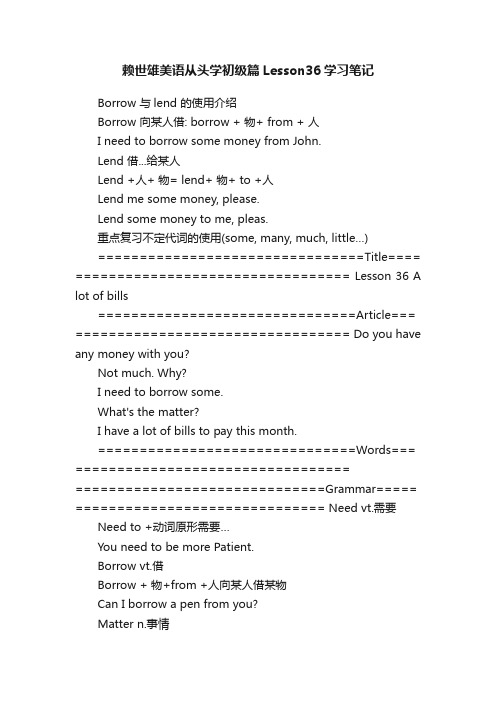
赖世雄美语从头学初级篇Lesson36学习笔记Borrow 与lend 的使用介绍Borrow 向某人借: borrow + 物+ from + 人I need to borrow some money from John.Lend 借...给某人Lend +人+ 物= lend+ 物+ to +人Lend me some money, please.Lend some money to me, pleas.重点复习不定代词的使用(some, many, much, little…)================================Title==== ================================= Lesson 36 A lot of bills===============================Article=== ================================= Do you have any money with you?Not much. Why?I need to borrow some.What's the matter?I have a lot of bills to pay this month.===============================Words=== ===============================================================Grammar===== ============================== Need vt.需要Need to +动词原形需要…You need to be more Patient.Borrow vt.借Borrow + 物+from +人向某人借某物Can I borrow a pen from you?Matter n.事情What's the matter( with you)?= what's wrong ( with you)?================================讲解===================================== Lesson thirty-six a lot of bills.Hello this is Peter Lai again. Very happy to be on the air. Now let's open this book to page one hundred fifty-seven. Page one hundredfifty-seven on this page we can see lesson thirty-six "A lot of bills."A lot of 后可以放复数名词或不可数名词.He has a lot of money. I have a lot of time.He has a lot of friends.而否定要用much.He doesn't have much money. = he doesn't have a lot of money.而肯定句尽量用a lot of.否定句用a lot of, much都可以He doesn't have much time. 他没有许多的时间.不要用在肯定句:He has much time. He has much money. 错错错.Much 多与not 并用在否定句中Bill 是可数名词" 账单"A bill. Two bills. Many bills.Part on reading.I feel sorry for Al. 我对al表示难过.This is a dialog between a boy by the name of Al and a girl by the name of Sue. Al 和Sue的对话.Al doesn't have much money. I feel sorry for him.他钱不多,我为他感觉难过.I feel sorry for you, John. 我为你感到难过.Do you have any money with you?any用在否定句或疑问句中后放可数不可数名词. 同时放单数,复数都可Do you have any friend/ friends?No, I have no friend/ friends. No后也是可以放单数或复数名词Yes, I do. Have ten dollars with me. 我有10块钱(在身上)With 在be动词后也有用法.She is with Peter now. 他现在跟皮特在一起. (这表示他以前和别人一起的). Now she is with Peter.I don't like to be with him. 我不喜欢和他一起.He doesn't study, he is not a good student. I don't like to be withhim. 他不是五道杠学生,我不喜欢和他一起.How much money do you have with you? 你有多少钱在身上?much用于不可数,many用于可数.How many friends do you have? (没有with you)你有多少朋友?I have twenty dollars with me. 我身上有20块钱.Not much. Why?Yes, I do. But I don't have much money with me. 这简化出来的.Do you have any friends? 你有没有朋友啊?Yes, I do, but I do not have many friends. 我有但不多.Why do you ask me such a question? 你为什么问这狗屁问题?Why 也等于what for.I need to borrow some.Need 的用法之前有介绍过,与want 差不多.我们来复习一下Need to +动词原形. You need to be more careful.你需要更小心.Need +人/物: I need you.我需要你. I need some food.Need + 人+ to +动词原形:I need you to go away.我要你滚蛋.还有need与want的分别记得吗?Need 翻译: 需要(更强烈). Want 翻译: 想要(无可无不可). 在一些情况下可相互代用.I need to 在这等于I want toI want to borrow some.I need to write a letter. I want to write a letter.Borrow 借Borrow +物+ from +人I need to borrow twenty dollars from him.我要跟他借20块.Don't borrow money from him. 不要向他借钱.Lend. 把……借给…Lend + 人+ 物(这有点像授予动词吧)= Lend +物+ to +人不要借钱给他(他从来不还的)Don't lend him any money.Don't lend any money to him.原句写的borrow some 是省略,原句应该是:I need to borrow some money from you.What's the matter?matter在这虽然是名词,但当成形容词用.= wrong.You are wrong. You give me the wrong answer.你错了,你给了我错误的回答.Two and two are four.You are right. 你太聪明了.What's the matter? = what's wrong?What's wrong? Lady.There is nothing wrong/ (the matter).nothing大家还记得: 他的形容词要放后面修饰.这里一样可以放the matter.证明看起来是个名词,实际当形容词用.There's nothing wrong with me.我没问题.他出什么问题了: there is something wrong with him.There is something the matter with him.I have a lot of bills to pay this month.时间副词:To pay this month.看起来好像是: 付这个月. 其实不是This month虽然也是个名词样,但当成时间副词用的. 也可以放在句首This month I have a lot of bills to pay.This +时间名词前面都不需要加介词 .I'll be very busy this week. 这个星期我会很忙.This year I'll be very busy. 今年我会很忙.(这下完了)Pay 支付You should pay the money.你要付这笔钱.You should pay the bill. 你要付这个账单 .轮到你付账了It is your turn. 轮到你啦.It's your turn to pay the bill.练习:Marry is crying.What's the matter with her?What's wrong with her?She doesn't have money.She doesn't have much money.Can you lend me ten dollars?Can you lend ten dollars to me?Don't borrow any money from him.===============================Practice== ================================= 这里主要复习不定代词There are ____ pencils on the table.A few, much, little, a little.这里很明显,pencils是复数,所以一下就排队了3个Much 很多. 修饰不可数. 而且用于否定句.Little 没有多少.修饰不可数A little, 有一些. 同样修饰不可数There is little time left. 没剩下多少时间了.There is still a little time. 还有点时间.Few,修饰可数, 没多少A few 有一些, 修饰可数我有一些朋友: I have a few friends.我没几个朋友: I have few friends.We need ____ food for the party.Many, several, a lot, lots of.Many 很多, 修饰可数Several 一些,修饰可数记得课文吗: there are several foreign students in my classA lot of, 很多, 修饰可数不可数Lots of, 就等于a lot of. 但注意看,这里面的选择,没有of.He has a lot of friends. == he has lots of friends.He has a lot of money. == he has lots of money.How ____ students are in the room?Much, few, many, a few.这里how开头表示多少的的疑问句,只有how much/ how many 而much问不可数,many 用在可数,所以...There is ____ juice in the refrigerator.Lots, a little, a lots of, many.上面现在都解释过了,所以接下来的应该会了There are many students in the classroom.There are ____children playing in the yard.A little, much, several, severals.There is something ____ with Fred.Matter, the matter, the wrong, what's wrong.这里复习the matter, wrong的使用. wrong是形容词不加冠词================================others== =================================。
赖世雄美语从头学初级篇Lesson 23学习笔记

Belong单词的使用(要加to)指示代词(this that these those)的使用名词性所有格的使用场所副词(there, here)使用(偶尔前加over强调)===================================================================== Lesson 23 The book is mine===============================Article==================================== This is my English book. It belongs to me. It is mine. That is your Englishbook. It belongs to you. It is yours. Those books aren't ours. They belong to those boys over there. They are theirs. Why do we all have different books?Because we belong to different classes.===============================Words==================================== English 英文,英语n.John is Chinese, but he speaks English well.Belong 属于vi. (与介词to并用)Belong to 属于…Put the umbrella down. It doesn't belong to you.Different 不同的a.I like many different kinds of books.Class 班级,课n.What time is your history class?名词性所有格Mine, yours, ours, theirs==============================Grammar=================================== 指示代词This is my English book.That is your English book.Those books aren't ours.These books are theirs.上面this,that,those,these为指示代词。
美语从头学笔记

精心整理《美语从头学·入门篇》笔记Lesson1Greetings打招呼..................................................................................... 错误!未指定书签。
Lesson2Courtesy礼貌 .......................................................................................... 错误!未指定书签。
Lesson3Name,AgeandNationality姓名、年龄和国籍 ..................................... 错误!未指定书签。
Lesson4Introductions介绍................................................................................... 错误!未指定书签。
Lesson5Occupations职业 .................................................................................... 错误!未指定书签。
Lesson6Time时间 ................................................................................................ 错误!未指定书签。
Ⅰ★n. Don ★★★Bad Bed★★Hi you,Fine,thanks.不错,谢谢你。
Notbad,thanks.还不错,谢谢你。
So-so,thankyou.马马虎虎/还过得去,谢谢你。
▲ B.“Howhaveyoubeen?”是“Howareyou?”的完成式,故答句不可说“I'mfine,thankyou.”或“Iamfine,thankyou.”而要说“Ihavebeenfine,thankyou.”或“Fine,thankyou.”▲C.问候句“How'sitgoing?”、“What'sup非you你。
赖世雄美语从头学初级篇Lesson 24学习笔记

疑问代词Whose 的用法练习部分重点复习this, that, these, those. 的用法Same 的用法the same as…the same color as…In the back of的用法===================================================================== Lesson 24 It's Mine===============================Article==================================== Whose test paper is this?It's mine, ma'am.And whose test paper is this?It's Tony's, ma'am.And why are your answers exactly the same as his?Because Tony has eyes in the back of his head.===============================Words==================================== Whose 谁的pron.这是疑问代词(谁的),放在句首。
whose可作形容词性或名词性所有格代词,作形容词性所有格后接名词,作名词性所有格之后不接名词。
This is whose dog? 错,疑问代词要放句首Whose do g is this?这是形容词性,后接名词。
这是谁的狗This dog is whose?错Whose is this dog?名词性所有格,后主语BE动词倒装。
这只狗是谁的ma'am 夫人,女人n.Ma'am 是madam是缩写,读也好读点。
是对女士的尊称,对男士用sir。
赖世雄美语从头学初级篇Lesson 16学习笔记

重点复习方向介词的使用. 以及现在进行时疑问句To the right/left of…===================================================================== Lesson 16 Where are my Keys?===============================Article==================================== Where are my keys?I don't know. Are they on the dresser?No, they aren't.Are they under the bed?No. Oh, here they are.Where?In my pocket.===============================Words==================================== ==============================Grammar=================================== ================================讲解===================================== Lesson sixteen Where are my keys?Hi, everybody this is Peter Lai. Glad to see you on the air again.This is very short dialog between Nick and Sandy.这是一段尼克和森迪之间非常短的对话Where are my keys?key+s证明有好几个钥匙串一起的又复习一下疑问句: my keys are where?我就不重复了步骤了: where are my keys?He is nice. 改疑问: is he nice? 他好吗He is where. 改: where is he? 他在哪You live where. 改Where do you live? 你住在哪You where study English 改Where do you study English.你在哪学英语.Key 还可作:掌握…通晓 ...的关键What is the key to success? 什么是成功的关键. 介词要用toHardwork is the key to success. 努力是成功的关键.Hardwork n.努力工作/ 勤奋I've lost the key to the room. 我弄丢了这房间的钥匙I don't know. Are they on the dresser?Dresser 化妆台n.No, they aren't.No, they aren't on the dresser. Where are they?Are they under the bed?under在什么下面: there's a dog under the table.有只狗在桌下.There's a book on the desk.桌子上有本书.这里是指书桌.No. Oh, here they are.Here they are. 本来要说,oh, they are here.但这是习惯用法:here放前后放代词再放be动词Where is John? I been looking for him.约翰在哪,我一直在找到.找到了就说: here you are!I just lost my pen. I can't find it. I don't know where it is. Where is mypen? 我弄丢子钢笔,我找不到它了,不知道在哪.最后终于找到了就说: here it is!注意一定是here+代词+be动词Here she is. Here you are. Here I am. Here it is.Where?In my pocket.这里省略了: there're in my pocket.Bed 床. 我们去睡觉吧: let's go to bed.在这里bed和school一样的.并不是指床而是指睡觉.所以不加theLet's go to the bed.是指走到床边去很多这种强烈表示的名词,直接指去做什么,而不是指名词本身.像这种在go to后不需要加the. 他天天去上学: he goes to school every day.He doesn't go to school on Sundays. 每逢周末他是不需要上学的.这里Sunday+s了. He is busy on Sundays.You should go to bed. It's late. 这个it是指现在时间.it is five.现在五点. It is Sunday. 今天星期天.Pocket. He has some pocket money every day.他每天都有些零钱===============================Practice=================================== We have an exercise here.我有有练习在这We have a test here. 这有个小考试Bill is sitting to the ____ of Mary.In . On. Right. Next to .There's a school to the right of post office.邮局的右边有座学校.There's a bank to the left of post office.邮局的左边有座银行.There's a library next to our school.我们学校旁边有座图书馆.Why ____ she washing the dishes?Isn't. is not. Aren't. are not.dishes是盘子的复数这里is not不能这样放,要这样:Why is she not washing…..这样才行造句: 他为什么在写信:Why is he writing a letter?他为什么不写信呢:Why isn't he writing a letter?Larry is standing ____ Mary and Jane.In, between. Left. Inside.这里明显是between a and b.如果是用left那要:To the left ofLarry is standing to the left of Marry and Jane.Larry 站在这两人的左边Why aren't you ____his bicycle?Clean. Ride. Playing. Fixing.这里有be动词,所以是现在进行时,所以只能用fixing. playing骑自行车不用这个,riding才是There is a trash can ____ to the refrigerator.Between. Next. At. Behind.What is that ____?Between the bed. In your pocket. To the left dresser. In your keys.这题是非常好的复习:第一个between a and b这个明显少了and …第三个to the left dresser中间少了of第四个in your keys.在你的钥匙里.这个好奇怪================================others===================================。
美语从头学笔记
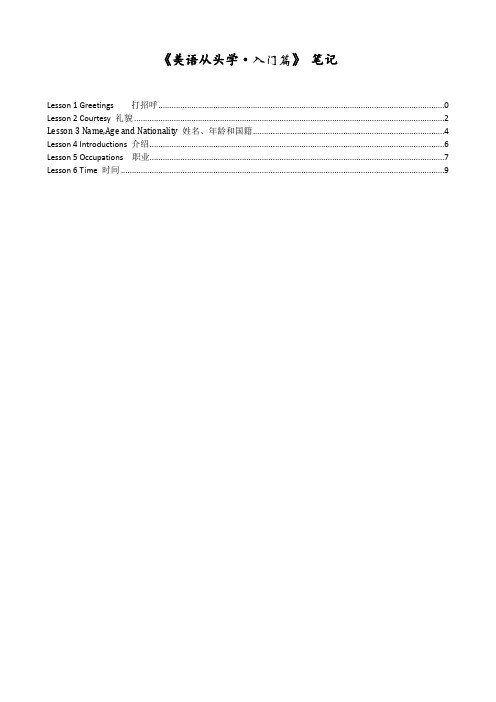
《美语从头学·入门篇》笔记Lesson 1 Greetings 打招呼 0Lesson 2 Courtesy 礼貌 (2)Lesson 3 Name,Age and Nationality 姓名、年龄和国籍 (4)Lesson 4 Introductions 介绍 (6)Lesson 5 Occupations 职业 (7)Lesson 6 Time 时间 (9)Lesson 1 Greetings打招呼Ⅰ.Dialog 会话Dialog AA:Good morning, are you?B:Hi,'m you?A:Not .B: you.A:Bye.甲:早啊,小梅。
你好吗?乙:嗨,汤姆。
我很好,你呢?甲:还不错,谢了。
乙:很好,再见。
甲:再见。
Dialog BA:Hi,'s it going?B: how are you doing?A:Not bad.B: you later.A:Take care.B:You too.甲:嗨,小梅。
近来如何?乙:很好,那你呢?甲:还不错。
乙:好吧,再见。
甲:保重。
乙:你也是。
★Greetings这个词是复数n.问候招呼致意Don't forget to say greetings to uncle Wang.★会话★ morning Good morning=I hope you have a good morning.★Bad 坏Bed 床This bed is bad.这张床坏了。
★这个词是复数★Hi≈Hey。
Hey不礼貌。
★=wonderful=coolⅡ.Vocabulary﹠Idioms 单词短语注解★ morninggood morning--good afternoon--good evening晚上好Good night 晚安、再见≠good evening ★'s a fine day today.今天天气不错。
Ⅲ.Grammar Notes 语法重点★ morning 早安(见面时使用)Good afternoon 午安(见面时使用)Good evening 晚安(见面时使用)Good night 晚安(道别时使用)★2.再见Goodbye、bye、see you later、see you、see you tomorrow.★★3.注意下列问候语的区别:①How are you?你好吗?(多用于正式场合)②How are you doing?你好吗?(多用于熟朋友之间)③How are you getting along?你好吗?④How have you been?你最近还好吗/近况如何?⑤How's it going?还好吧/近况如何?⑥What's up?近况如何?(多为年轻人所用)⑦What's happening?近况如何?(=What's up?)★★4.注意下列的答句:▲A.上列问候语中,前三个问句均有you,故可使用下列答句:问句:How are you?你好吗?=How are you doing?=How are you getting along?答句:I'm fine,thank you.我很好,谢谢你 Great,thanks.很好,谢谢你。
- 1、下载文档前请自行甄别文档内容的完整性,平台不提供额外的编辑、内容补充、找答案等附加服务。
- 2、"仅部分预览"的文档,不可在线预览部分如存在完整性等问题,可反馈申请退款(可完整预览的文档不适用该条件!)。
- 3、如文档侵犯您的权益,请联系客服反馈,我们会尽快为您处理(人工客服工作时间:9:00-18:30)。
《美语从头学·入门篇》笔记Lesson 1 Greetings 打招呼 (1)Lesson 2 Courtesy 礼貌 (3)Lesson 3 Name,Age and Nationality 姓名、年龄和国籍 (5)Lesson 4 Introductions 介绍 (7)Lesson 5 Occupations 职业 (8)Lesson 6 Time 时间 (10)Lesson 1 Greetings打招呼Ⅰ.Dialog 会话Dialog AA:Good morning,May.How are you?B:Hi,Tom.I'm fine.And you?A:Not bad.Thanks.B:Good.See you.A:Bye.甲:早啊,小梅。
你好吗?乙:嗨,汤姆。
我很好,你呢?甲:还不错,谢了。
乙:很好,再见。
甲:再见。
Dialog BA:Hi,May.How's it going?B:Great.And how are you doing?A:Not bad.B:Ok.See you later.A:Take care.B:You too.甲:嗨,小梅。
近来如何?乙:很好,那你呢?甲:还不错。
乙:好吧,再见。
甲:保重。
乙:你也是。
★1.GreetingsGreetings这个词是复数n.问候招呼致意Don't forget to say greetings to uncle Wang.★2.Dialog 会话★3.Good morning Good morning=I hope you have a good morning.★4.badBad 坏Bed 床This bed is bad.这张床坏了。
★5.Thanks这个词是复数★6.HiHi≈Hey。
Hey不礼貌。
★7.Great=wonderful=coolⅡ.Vocabulary﹠Idioms 单词短语注解★1.good morninggood morning--good afternoon--good evening晚上好Good night 晚安、再见≠good evening★2.It's a fine day today.今天天气不错。
Ⅲ.Grammar Notes 语法重点★1.good morning 早安(见面时使用)Good afternoon 午安(见面时使用)Good evening 晚安(见面时使用)Good night 晚安(道别时使用)★2.再见Goodbye、bye、see you later、see you、see you tomorrow.★★3.注意下列问候语的区别:①How are you?你好吗?(多用于正式场合)②How are you doing?你好吗?(多用于熟朋友之间)③How are you getting along?你好吗?④How have you been?你最近还好吗/近况如何?⑤How's it going?还好吧/近况如何?⑥What's up?近况如何?(多为年轻人所用)⑦What's happening?近况如何?(=What's up?)★★4.注意下列的答句:▲A.上列问候语中,前三个问句均有you,故可使用下列答句:问句:How are you?你好吗?=How are you doing?=How are you getting along?答句:I'm fine,thank you.我很好,谢谢你 Great,thanks.很好,谢谢你。
Fine,thanks.不错,谢谢你。
Not bad,thanks.还不错,谢谢你。
So-so,thank you.马马虎虎/还过得去,谢谢你。
▲B.“How have you been?”是“How are you?”的完成式,故答句不可说“I'm fine,thank you.”或“I am fine,thank you.”而要说“I have been fine,thank you.”或“Fine,thank you.”▲C.问候句“How's it going?”、“What's up?”、“What's happening?”的主语并非you,故答句不可说“I'm fine,thank you.”兹分述如下:问句:How's it going?还好吧/近况如何?答句:Great,thank you.很好,谢谢你。
Fine,thank you.不错,谢谢你。
Not bad,thanks.还不错,谢谢你。
So-so,thank you.马马虎虎/还过得去,谢谢你。
问句:What's up?、What's happening?近况如何?答句:Nothing much.没什么。
Same as usual.老样子。
★5.表示“感谢”的用语:Thanks.Thank you.Thank you very much.Thanks a lot.Thanks a million.(谢谢你一般万次) Ⅳ.Substitution 替换★1.How are you?=How are you doing?你好吗?★2.And you?=What about you?=How about you?★3.How's it going?、What's up?、What's happening?近来如何?Ⅴ.Exercises 练习Where there is a will there is a way. 有志者事竟成。
Lesson 2 Courtesy 礼貌Ⅰ.Dialog 会话Dialog AA:Excuese me.Are you Ann?B:No.I'm not.A:I'm sorry.Who's Ann?B:She is.A:Thank you.B:You're welcome.甲:对不起,请问你是安吗?乙:不,我不是。
甲:很抱歉。
请问安是哪位?乙:她是。
甲:谢谢。
乙:不客气。
Dialog BA:Hi,I'm Tom.B:I beg your pardon?A:I'm Tom.B:Oh!Hi,Tom.I'm May.A:Nice to meet you,May.B:Pleased to meet you.甲:嗨,我是汤姆。
乙:对不起,请再说一遍好吗?甲:我是汤姆。
乙:哦!嗨,汤姆。
我是小梅。
甲:很高兴认识你,小梅。
乙:幸会,幸会。
★1.Courtesy costs nothing.礼多人不怪★2.May I beg your pardon?=I beg your pardon?=Pardon?Ⅱ.Vocabulary﹠Idioms 单词短语注解★1.idiot 傻瓜≠idiom短语、成语★2.courtesy 名词礼貌★3.beg 动词请求,恳求。
★4.pardon 名词原谅,宽恕。
Ⅲ.Grammar Notes 语法重点★1.Excuese me.对不起/打扰一下。
I'm sorry.对不起/抱歉。
以上两句均译成“对不起”,但用法有别:“Excuese me”用于唤起别人的注意;而“I'm sorry”则多表示“抱歉”,尤其是在犯错或有不好的消息要告诉对方时使用。
例句:A:Excuese me.Where is the station?B:I'm sorry.I'm new here.注意:“Excuese me”“I'm sorry”之后除可置句点以外,亦可置逗点,再置连接词but,以连接另一个句子。
But原意为“但是”,但此处不必译出。
因此上列例句亦可写成:A:Excuese me,but where is the station?B:I'm sorry,but I'm new here.★2.You're welcome.别客气。
对方表示谢谢时,可用下列句子或用语回答,这些句子或用语均可译成“别客气”:A:Thank you for your help.B:You're welcome.=Don't mention it.=Not at all.=No problem.★3.I beg your pardon?对不起,请再说一遍好吗?May I beg your pardon?=I beg your pardon?=Beg your pardon?=Pardon me?=Pardon?★4.Nice to meet you.很高兴认识你/幸会。
=Pleased to meet you.=Glad to meet you.这三句分别由下列完整的句子简化而成:It's nice to meet you.I'm pleased to meet you.I'm glad to meet you.★4.英文中很多句子都是“代名词+be动词”开头的,但在口语中,常为求说话的速度及口气的自然,经常将其简化。
“代名词+be动词”简化表人称简化前简化后第一人称单数I am(我是)I'm 复数we are(我们是)we're第二人称单数you are(你是)you're 复数you are(你们是)you're第三人称单数he is(他是)he'sshe is(她是)she'sit is(它是)it's复数they are(他/她/它们是)they'reLesson 3 Name,Age and Nationality 姓名、年龄和国籍Ⅰ.Dialog 会话Dialog AA:Excuese me.What’s your name?B:I’m May.A:Hi,May.Where are you from?B:I’m from Hong Kong.What about you?A:I’m from Japan.甲:对不起,请问你叫什么名字?乙:我叫小梅。
甲:嗨,小梅。
你是哪里人?乙:我是香港人。
那你呢?甲:我是日本人。
Dialog BA:May I have your name,please?B:My name is May.A:How old are you?B:I’m twenty-five.A:Where are you from?B:I’m from Hong Kong.甲:请问尊姓大名?乙:我叫小梅。
甲:你几岁了?乙:我25岁。
甲:你是哪里人?乙:我是香港人。
Ⅱ.Vocabulary﹠Idioms 单词短语注解★1.nationality 名国籍★2.what about you?那你呢?And you?你呢?★3.where are you come from? (×)where are you from? (√)where do you come from? (√)where do you from? (×)上面4句话,只有where are you from?和where do you come from?是正确的。
